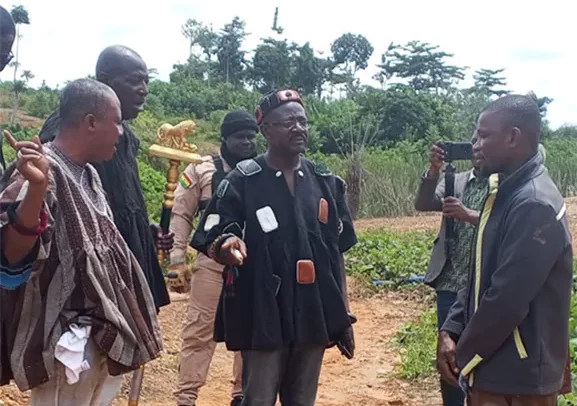Daasebre Akuamoah Boateng III confronting one of the illegal miners
The Paramount Chief of the Kwahu Traditional Area, Daasebre Akuamoah Boateng III, has warned illegal miners to immediately cease their activities within the Kwahu area.
The chief issued the warning during visits to some illegal mining, popularly known as galamsey, hotspots in Kwahu where he observed firsthand the environmental devastation caused by unregulated gold extraction, especially the destruction of farmlands and contamination of water bodies.
Accompanied by a delegation from his palace and members of the media, Daasebre Akuamoah Boateng III visited some affected communities including Kwahu Apradan, Esaase, Saasu, Asempanaeye, Atsotsobosu, Praso, Kofi Dede, Aprahwem, Kwame Agyei, and Akwasiho.
During the tour, the chief, who observed widespread destruction of lands by illegal miners, described the situation as deeply alarming and called for immediate action to save the region’s natural resources.
“Almost every river near a mining site is polluted. They dam the rivers, they dig channels through them, and introduce mercury to extract gold. It’s heartbreaking,” he stated.
In one instance, one of the miners casually showed the chief a container of mercury, explaining how it was used in processing gold, among other items used in gold extraction.
According to Daasebre Akuamoah Boateng III, most of the people engaged in illegal mining in the area are non-indigenes from the Northern parts of the country and neighbouring countries like Niger.
“We saw very few locals involved. Most of the miners are from outside Kwahu. Outsiders are invading our lands and destroying our resources,” the chief disclosed.
He also dispelled the claims that traditional leaders were complicit in galamsey activities, noting that that he has never been consulted, neither has any of his kingmakers been consulted by illegal miners since he was enstooled as the paramount chief of Kwahu.
“There is a common belief that chiefs give their consent before mining happens. But I want to state emphatically that no galamsey operator has ever approached me for permission, that is why I had to go out myself and caution anyone engaged in this activity,” he stated.
Daasebre Akuamoah Boateng III, who also visited Akroma Mining Company, a licensed operator in the area, commended the management of the company for responsible mining practices as well as the numerous social intervention programmes rolled out by the company to support the community where they operate.
He, however, raised concern over a disturbing trend where galamsey operators follow in the wake of legal companies and reopen abandoned pits to engage in galamsey, causing further destruction.
The Kwahuhene also appealed to the government and the Ghana Police Service to intensify efforts in curbing illegal mining activities not only in Kwahu but other parts of the country, while urging exploration companies to also consult traditional authorities before entering any community.
“We are custodians of the land. When our water is polluted and our people fall sick, it’s the chiefs who bear the burden. The government must work with us, companies cannot move in here and start working without our knowledge of their activities,” he noted.
He urged the public to resist the temptation of short-term gain by selling lands to galamsey operators as well as rise up against the galamsey menace that is fast destroying the natural habitat of man, while calling on companies to urgently embark on reclamation exercises to restore the affected lands in Kwahu.
“Nobody will protect Kwahu more than a Kwahu native. Let’s farm. Let’s preserve our water. Let’s embrace the agriculture. We need honest conversations, decisive leadership, and collective action to end this menace,” he added.
Daasebre Akuamoah Boateng III also invited all the people involved in galamsey activities in the area for further interrogation at his palace, as he works towards engaging National Security operatives to deal with such individuals.
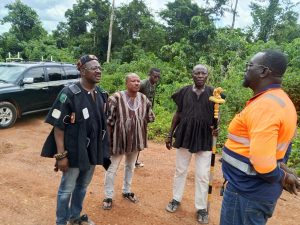
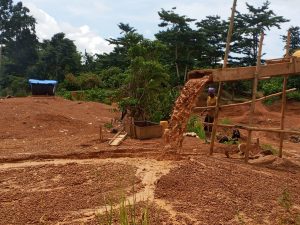
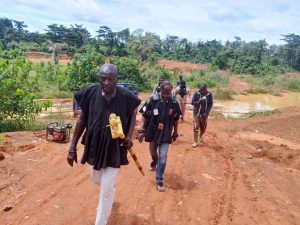
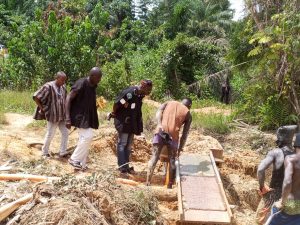
By Ebenezer K. Amponsah


